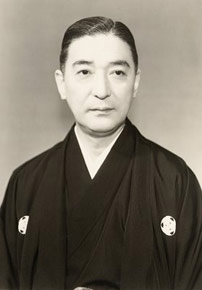Bandō Mitsugorō VIII
| Bandō Mitsugorō VIII 八代目坂東三津五郎 |
|
|---|---|
 |
|
| Born |
19 October 1906 Tokyo, Japan |
| Died | 16 January 1975 (aged 68) Kyoto, Japan |
| Other names | Bandō Yososuke III, Bandō Minosuke VI, Yamatoya |
Bandō Mitsugorō VIII (八代目 坂東 三津五郎 Hachidaime Bandō Mitsugorō?) (19 October 1906 – 16 January 1975) was one of Japan's most revered Kabuki actors from the 1930s until his death. He was a renowned tachiyaku and katakiyaku, specializing in particular in the aragoto style. He was officially designated as a "living national treasure" by the Japanese government in 1973.
Eighth in the line of Bandō Mitsugorō, he was adopted by Bandō Mitsugorō VII; his son and grandson would go on to take the name as well, becoming ninth and tenth in the line respectively.
Bandō made his stage debut at the age of 7, in 1913, as Bandō Yosouke III. He would take the name Minosuke VI in 1928, at the Meiji-za theatre.
He later tried to adapt The Tale of Genji to the stage, but was prohibited from doing so by the authorities. After a few years in a kabuki troupe run by the Toho company, he moved to Kansai; he lived there for nearly 20 years, performing in Osaka and other venues, and taking part in the final performances at the Ōsaka Kabuki-za, which closed and became a department store in 1958.
In 1962, following his return to Tokyo, and the death of his adopted father Bandō Mitsugorō VII, Bandō celebrated a shūmei (naming ceremony) alongside his son-in-law, Bandō Mitsugorō IX and grandson Bandō Mitsugorō X. He took the name Mitsugorō VIII. Four years later, he performed at the opening ceremonies for Tokyo's National Theater.
...
Wikipedia
